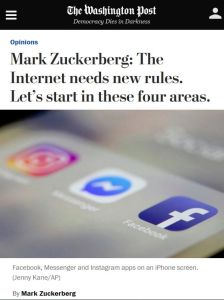
Mark Zuckerberg
The Internet Needs New Rules. Let’s Start in These Four Areas.
The Washington Post, 2019
What's inside?
Governments and internet service providers must share the responsibility of protecting internet users.
Recommendation
In an op-ed published by The Washington Post, Facebook CEO Mark Zuckerberg calls for internet regulation in four areas. Perhaps he is pressing ahead to shape inevitable regulation in his company’s favor, or maybe he wants to ensure that others face the same scrutiny as his prominent platform does. Some commentators have accused Zuckerberg of trying to outsource the costs and responsibility for protecting the public from potential misuses of his platform. Regardless of his motives, Zuckerberg’s proposal for a new regulatory framework constitutes a sensible starting point for discussing the future of internet governance.
Take-Aways
- To protect the rights and freedoms of individuals and serve the public interest, internet service providers and governments must work together to enforce common internet standards in four areas:
- First, future internet regulation must protect society from “harmful content” by setting common standards and holding platforms accountable for violating them.
- Second, regulators must define what qualifies as political advertising and establish unified standards for verifying political actors.
- Third, internet users around the world should be able to enjoy the same privacy and data protection standards.
- Fourth, internet users should be free to transfer their data between different platforms, while internetwide standards must ensure the protection of information in transit.
Summary
Governments and international regulatory bodies must provide the ground rules and actively monitor the internet to protect society from harmful and misleading content and to ensure people’s right to privacy and data portability. In particular, new internet regulations must address four specific areas:
- “Harmful content” – The internet must remain open for free speech, but both regulators and service providers have to protect the public from harmful content, such as incitements to terrorism and hate speech. Platform providers shouldn’t have sole power over – and responsibility for – making the necessary judgment calls. Instead, an independent institution should enforce standards across all platforms and hold violators accountable. Following the example of Facebook, major online providers should publish quarterly “transparency reports” on their efforts to keep harmful content at bay.
- “Election integrity” – Facebook has taken measures to increase transparency around political advertising, such as verifying advertisers’ identity and publishing information on who paid for the ad and who the target audience was. Regulators should define what qualifies as political advertising and establish standards for verifying political actors. These regulations must reach beyond elections to include ongoing influence campaigns about political issues.
- “Privacy” – Internet users around the world should be able to enjoy the same privacy and data protection standards. The European Union’s General Data Protection Regulations provide a useful starting point for devising global internet privacy rules. Any privacy protection standards must give users control over their content and punish companies for mishandling personal data. Moreover, future privacy protection regulations must define the cases in which regulators can subordinate privacy concerns in the name of the public interest, as well as provide guidelines for the handling of data by artificial intelligence and other emerging technologies.
- “Data portability” – Internet users should be free to transfer their data between different platforms as they see fit. Enabling internet users to switch easily among services will spur companies to innovate and cater to the interest of consumers. However, internetwide standards need to be in place to protect information in transit.
About the Author
Mark Zuckerberg is founder and CEO of the social media platform Facebook.
This document is restricted to personal use only.
My Highlights
Did you like this summary?
Read the articleThis summary has been shared with you by getAbstract.
We find, rate and summarize relevant knowledge to help people make better decisions in business and in their private lives.
Already a customer? Log in here.


















Comment on this summary